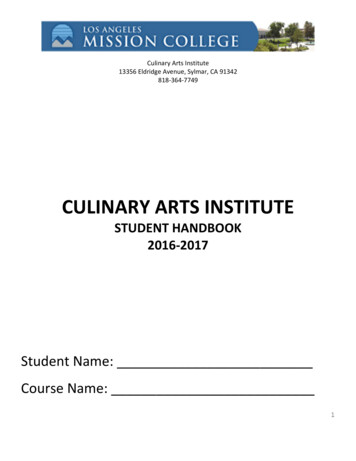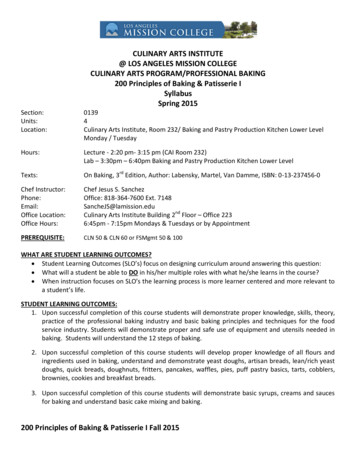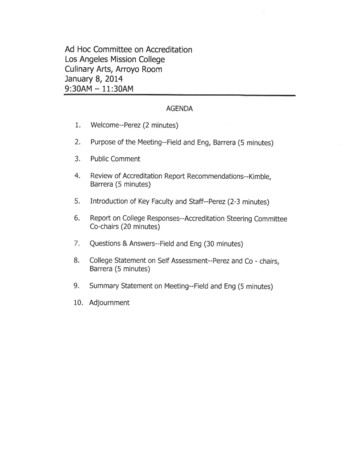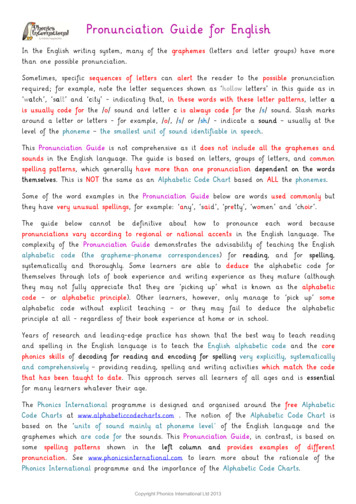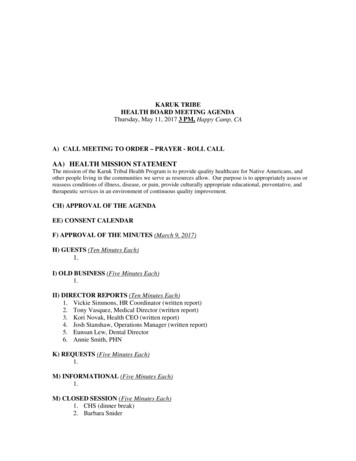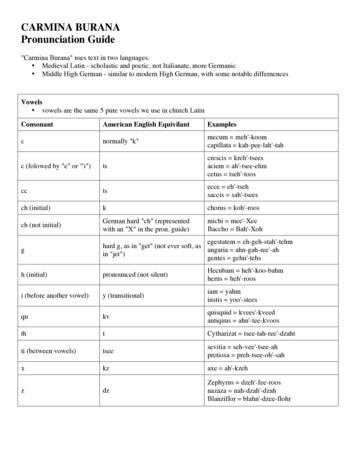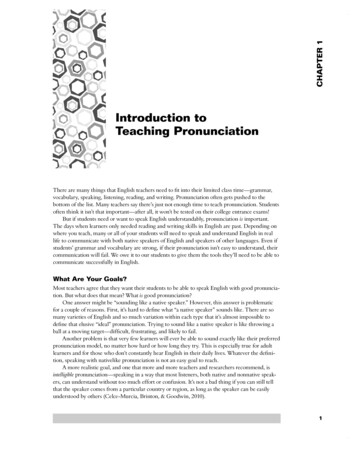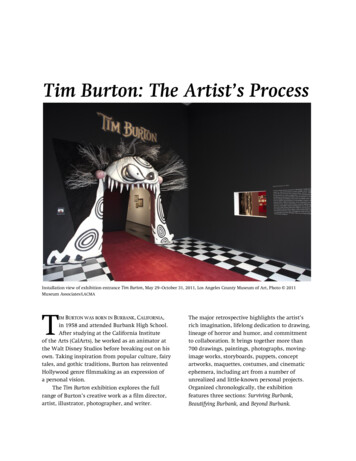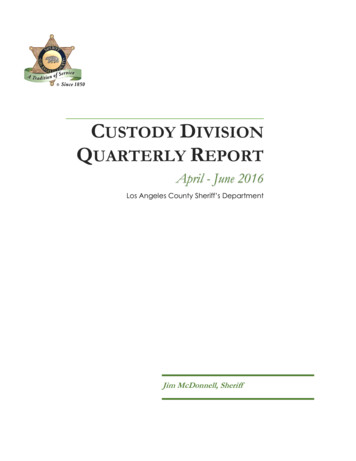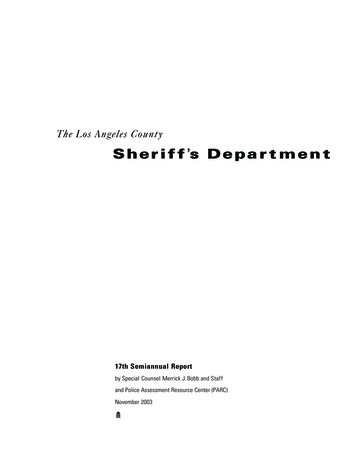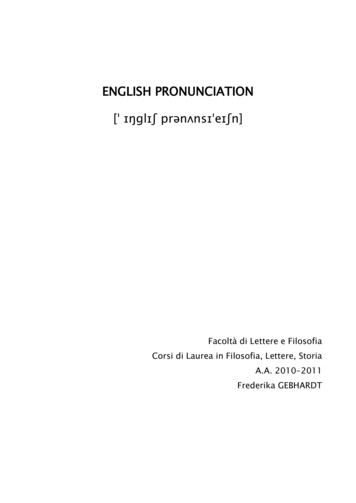
Transcription
ENGLISH PRONUNCIATION[ˈ ɪŋglɪʃ prənʌnsɪˈeɪʃn]Facoltà di Lettere e FilosofiaCorsi di Laurea in Filosofia, Lettere, StoriaA.A. 2010-2011Frederika GEBHARDT
INDEXUNIT 1 PHONETIC SYMBOLS AND SOUNDSp.3IPA symbols – vowels, dipthongs, consonantsUNIT 2 ENGLISH SPELLING AND SOUNDSp.9Difficult vowel and consonant combinations-s and –ed suffix pronunciationHomographs, homophones, silent lettersUNIT 3STRESS PATTERNS IN WORDSp.16Syllable division, primary stress patterns in prefixand suffix endings of nouns, verbs, adjectives,compound nouns and adjectivesUNIT 4 STRESS PATTERNS IN PHRASESp.22Weak stress in function words, auxiliaryand modal auxiliary verbsUNIT 5ENGLISH WORDS USED IN ITALIANp.26Pronunciation of words commonly used in ItalianEnglish words translated into Italian, false anglicismsANSWER KEY TO EXERCISESp.282
INTRODUCTIONThe text follows the contents of G. Ludbrook: English Pronunciation. CD (EdizioniErickson)Unlike Italian, English is not a phonetic language which is the principle reason why it isdifficult to write and pronounce English words. Although there are 26 letters in theEnglish alphabet, the sounds that may be produced are almost double that number. Thistext is a short introduction to the phonetic transcription of English phonemes (vowel understandingofEnglishpronunciation, improve speech and reading, and help students consult a dictionary. Thephonemic transcriptions in dictionaries are based on the standard English accent knownas „Received Pronunciation‟ (RP for short) and other regional and international Englishaccents will not be considered here. The text will focus particularly on sounds that aredifficult to pronounce for Italian students and those that may be easily confused.Another common problem is the stress placed on the pronunciation of words andphrases, as English is stress-timed, unlike Italian which is syllable-timed. Attention ispaid to strong and weak stress in words and phrases, taking into consideration functionwords, contracted forms, compound nouns and adjectives, prefixes and suffixes. Theproblem of English spelling is explored through a brief study of homophones,homographs and silent letters.In conclusion, there is a brief section on English words used in Italian that are oftenmispronounced, and false anglicisms (words used by Italians that do not exist in English).Frederika Gebhardt3
UNIT 1 PHONETIC SYMBOLS AND SOUNDSInternational phonetic alphabet symbolsVowels/ɪ/pin, English, business/ʌ/cut, come, mother/e/bed, head, bury, exit/ɜː/girl, burn, word, heard/æ/cat, bag, apple, black/ɑː/car, art, heart, half/ə/the, a, woman, banana/ɔː/or, board, door, small/ʊ/look, put, could, cushion/ɪː/sea, bee, people, receive/ɒ/clock, what, because/uː/too, blue, fruit, fool/eɪ/take, pay, wait, ballet/ɑʊ/round, renown, doubt/ɑɪ/five, sigh, height, buy/ɪə/here, deer, dear, fierce/ɔɪ/noise, boy, lawyer/eə/care, air, mayor, prayer/əʊ/no, road, sew, broken/ʊə/poor, insure, tour, moor/p/play, stop, speak, power/ʒ/genre, measure, vision/b/bad, baby, big, object/h/hot, hair, whole, whose/t/ten, later, little, pot/m/moon, lamp, lamb/d/day, advice, bed/n/can, snow, pneumonia/k/character, quick, taxi/ŋ/string, singer, tongue/g/got, exam, ignore, finger/tʃ/chair, match, future/f/food, laugh, telephone/dʒ/just, general, age, soldier/v/vain, over, Stephen/l/look, small, bottle, isle/θ/thin, earth, method, both/r/real, train, wrong, write/ð/they, father, breathe, with/j/yes, Europe, university/s/small, since, scene, psalm/w/window, twin, quick, why/z/zoo, goes, xenophobe/ʃ/shell, nation, machineDipthongsConsonants4
Exercise 1 Match the phonetic transcriptions with the words.1. /ʃʌt/a. later2. /hɑːt/b. joke3. /θɪŋk/c. heart4. /wɜːk/d. there5. /leɪtə/e. doubt6. /bɔːt/f. work7. /puːl/g. shut8. /dɑʊt/h. think9. /dʒəʊk/i. pool10. /ðeə/j. boughtExercise 2 Listen to the following words and circle the sound that you //ɔː/10./ʃ//ʒ/Exercise 3 Complete the transcriptions with one of the following dipthongs:/eɪ/1. make/ɑɪ//ɔɪ//əʊ//ɑʊ//m k//ɪə//eə//ʊə/6. hear/h /2. sure/ʃ /7. town/t n/3. bear/b /8. home/h m/4. island/- - lənd/9. sight/s t/5. employ /ɪmpl /10. know/n /Exercise 4 Write out the correct spelling of these place names.1. /kæntəbrɪ/2. /grenɪtʃ/3. /lestə/4. /edɪnbrə/ 5. /wɒrɪk/5
Some difficult sounds for Italian speakers of English/ə/This is the most frequent vowel sound in spoken English, which can also representseveral letters or syllables. It can be found in unstressed function words such as a, am,an, but, can, of; in prefixes and suffixes such as in-, suc-, to-, ad-, -ible,ment; in words such as according, lemon, minute, purpose, second etc.-able, -Exercise 5 Listen to the teacher and underline the /ə/ sound in the following sentences.1. We went to the theatre yesterday.2. He can speak Russian and German.3. Susan is famous for her Christmas cake.4. The pronunciation, grammar and vocabulary are difficult.5. We could ask them if they have reached a decision.6. A man and a woman were waiting at the station.7. They‟re going to the mountains on Saturday.8. The private sector is all economic activity other than government.9. Where are the spoons and forks?10. There were seven or eight hundred people present at the conference./ɜː/A difficult sound to reproduce for Italian speakers: world - /wɜːld/, third - /θɜːd/.Exercise 6 Tick the words that contain the /ɜː/ sound.1. Thursday5. Tuesday9. birthday13. ball2. does6. work10. turn14. hurt3. skirt7. ear11. bun15. early4. short8. nurse12. weren‟t16. ward/ʌ/There are several letter combinations that produce this sound: mother -/mʌðə/, country- /kʌntrɪː/, flood - /flʌd/Exercise 7 The teacher will read out the following sentences. Underline the alternativethat you hear.1. Which county/country did you say he lived in?2. She rubbed/robbed the silver to make it shinier.3. There are a lot of colourful rags/rugs on the floor.6
4. Can I borrow your cup/cap?5. We were wondering/wandering where she was.6. She has a heart/hut of gold.7. Put the batter/butter in the fridge.8. Did you say he run/ran away?9. There was a big cart/cut in the wood.10. He tripped over the stump/stamp on the ground./ɪ/Italian does not have this sound: fill - /fɪl/, ship - /ʃɪp/.Exercise 8 Say whether the pairs of words you hear are the same (S) or different (D).1.6.2.7.3.8.4.9.5.10./θ/ and /ð/These sounds do not exist in Italian, so they may be transformed in /t/, /f/ or /d/.Exercise 9 Write the following words under the correct phonetic sound.therethree breathe thin moth whether although nothing throw either/θ//ð//w/This sound tends to be pronounced by Italian speakers as /v/.Exercise 10 The teacher will read out the following sentences. Underline the alternativethat you hear.1. There was only a little vine / wine left.2. Where is the vest / west?3. I saw a long whale / veil in the distance.4. What was under the wheel / veal?5. Her poetry has become worse / verse.7
/dʒ/When written with a „J‟, Italian speakers tend to pronounce this sound as /j/. The letter„G‟ can also produce this sound: general, storage, as can the combination–dge and –age: edge, storage.Exercise 11 Tick the words that contain the /dʒ/ sound.1. gin5. yam9. jet13. damage2. large6. soldier10. gear14. mayor3. goat7. guilty11. just15. collage4. injury8. gum12. get16. college/h/This sound tends to be omitted by Italian speakers. However, the h is not pronounced insuch words as hour, honour, heir and honest, in some words and place names: exhibit,Totten(h)am, or in rapid speech: Tell (h)im we‟ll be late.Exercise 12 The teacher will read out sentences. Tick the word that you hear.1. illhill6. oldhold2. eyehigh7. heirhair3. artheart8. allhall4. airhair9. eighthate5. earhear10. edgehedge/s/Apart from the letter „S‟, the /s/ sound can be represented by a number of consonantcombinations, which differ in pronunciation from the Italian: psyche, cellar, science,listen.Exercise 13 Tick the words that contain the /s/ sound.1. song5. face9. issue13. disciple2. Islam6. city10. months14. sugar3. vision7. message11. castle15. mix4. science8. houses12. fascism16. psychology8
Exercise 14 Underline the word that the transcription represents.1. bɔːnburnborn2. θɪŋthingthin3. fɪːlɪŋzfillingsfeelings4. vɑɪnvinewine5. meɪdʒəmajormayor6. ræmrumram7. wɜːdwordworried8. fəgetforgetforged9. ɑɪseyesice10. huːzwhosehouseTongue Twisters Quickly say the following sentences.1. She sells sea shells on the sea shore.2. Thirty-three thrilling thespians thought throughout Thursday.3. I wish to wash my Irish wristwatch.4. In Hertford, Hereford and Hampshire, hurricanes hardly ever happen.5. A skunk sat on a stump.UNIT 2 ENGLISH SPELLING AND SOUNDSEnglish spelling is a particular obstacle to non-native speakers. This is due to the factthat during the course of its history it has been influenced by numerous languages,especially by German, Latin, French and the Scandinavian languages. Thus, for example,the sound /ʃ/ is to be found in the following letter combinations: shut, champagne,nation, expansion, conscience, issue, and sugar.Sometimes words do not sound alike despite their similar spellings (homographs): bow /bəʊ/ and /bɑʊ/, close - /kləʊz/ and /kləʊs/, live - /lɪv/ and /lɑɪv/. Other words soundalike, but are spelled differently (homophones): aren‟t / aunt - /ɑːnt/, bare / bear /beə/, and seen / scene - /sɪːn/.9
It was already noted over 400 years ago that English used more letters than necessary tospell many of its words, and during the 17th century numerous redundant letters wereremoved, the emergent standard spellings tending to prefer one of the shorter formsamong the alternatives previously in use. For example, in the 16th century the word bitwas sometimes spelt byte. Many words were reduced like byte by the loss of a silent final-E, the replacement of Y by I, and the simplification of doubled consonants. But manyother words have kept unnecessary letters, for instance the B in debt , the E in have or theP in receipt.After the 17th century this process of simplification of English spelling slowed down,thanks to the standardizing influence of printing andthe spread of dictionaries. TheAmerican lexicographer Noah Webster took the process of simplification a step further inthe early 19th century, and Americans today use some distinctive spellings of the type hisdictionary recommended, such as center, traveling, favor, defense, realize (Br.Eng. centre,travelling, favour, defence, realise).Difficult vowel combinations Practice saying the following wordsu: /ʌ/ - bun, /ʊ/ - put, /ɪ/ - busy, /e/ - bury, /uː/ - rude, /juː/ - huge,/ə/ -focus, /ɜː/ - burn.ea: /ɪː/ - beach, /e/ - bread, /eɪ/ - break, /eə/ - bear, /ɪə/ - dear.au: /ɑː/ - aunt, /ɔː/ - author, /ɒ/ - because, /eɪ/ - gauge.oo: /uː/ - too, /ʊ/ - look, /ʌ/ - flood, /əʊ/ - brooch, /ɔː/ - floor.ei: /eɪ/ - eight, /ɪː/ - receive, /ɪ/ - counterfeit, /e/ - leisure, /ɑɪ/ - heightui: /uː/ - fruit, /ɪ/ - build, /wɪː/ - suite, /ɑɪ/ - guide.ou: /ɑʊ/ - out, /əʊ/ - soul, /ʌ/ - touch, /ʊ/ - could, /uː/ - you, /ɔː/ - pour.oa: /əʊ/ - road, /ɔː/ - broad.ow: /ɑʊ/ - now, /əʊ/ - know, /ɒ/ - knowledge.ough: /əʊ/ - though, /uː/ - through, /ɔː/ - bought, /ɑʊ/ - drought, /ə/ - borough,/ɒf/ - cough, /ʌf/ - enough.augh: /ɔː/ - taught, /ɑːf/ - laugh.10
Difficult consonant combinations Practice saying the following wordsch: /k/ - character, /tʃ/ - choice, /ʃ/ - chef, /Ǿ/ - yacht.cc: /ks/ - success, /k/ - account, /tʃ/ - cappuccino.gn: /n/ - sign, /gn/ - recognise.ng: /ŋ/ - sing, /ŋg/ - finger, /ndʒ/ - danger.Exercise 15 Circle the word that is pronounced differently from the other three words.1. accidentaccessaccommodateaccept2. sheepbeerfieldpeople3. angryjungleEnglishspring4. shoutnowroundmould5. cheesechipmachineattach6. signatureforeignGnostictongue7. suitfruitcruisebiscuit8. thoughroughenoughtough9. floorpoorflooddoor10. authorcaughtlaughterdaughterSuffixes-s suffixThe morpheme -s of the 3rd person singular (he works), of the noun plural (books), ofthe genitive (John‟s) and of the contraction of is or has (he‟s) is pronounced in threedifferent ways depending on the sound of the preceding consonant:ɪzsafter sibilant consonants: hes/tʃɜːtʃɪz/wages/weɪdʒɪz/after unvoiced consonants: /f/ /k/ /p/ �ps/11
zin other ohn‟s/dʒɒnz/Some unvoiced sounds, θ and f , become voiced when the -s suffix is �ɪf/knives/nɑɪvz/Exercise 16Write the sound /s/, /z/ or /ɪz/ next to the following words.1. judges6. watches2. lives7. attends3. plates8. tapes4. classes9. books5. breathes10. wives-ed suffixThe morpheme -ed of the past tense (or past participle) is also pronounced in threedifferent ways depending on the preceding consonant:ɪdtdafter t and ɪd/rounded/rɑʊndɪd/after unvoiced consonants: /f/ /k/ /p/ /s/ tʃ wished/wɪʃt/in other casesearned/ɜːnd/carried/kær ɪd/changed/tʃeɪndʒd/harmed/hɑːmd/12
Exercise 17 Pronounce the past form of these regular verbs paying attention to the –edsuffix.1. study6. answer2. judge7. test3. listen8. invent4. miss9. research5. work10. enjoy-e suffixSometimes the addition of the –e suffix to a noun to form a verb changes the quality bothof the vowels sound and of the final –th:a bath/bɑːθ/to bathe/beɪð/a breath/breθ/to breathe/brɪːð/Exercise 18 Listen to the teacher and circle the word you hear.1. Breath/Breathe in deeply and then out again.2. Suits were usually made of wool cloth/clothe.3. I really loath/loathe the fashion of the 1980s.4. The medicine soothes/sooths the pain of the inflammation.5. The baby‟s teeth/teethe are coming through.HomographsSome examples of homographs:to leadto readto ɑɪv/The sound may also change according to the where the stress is on the word:to recordto presentExercise d//ˈpreznt/Listen to the sentences and circle the transcription that you hear.1. /hɑʊz//hɑʊs/2. /teə//tɪə/3. /kləʊz//kləʊs/4. /wɪnd//wɑɪnd/5. /ˈkɒntrækt//kən ˈtrækt/13
HomophonesSome examples of homophones:son / sunallowed / aloudminor / miner/sʌn//əlɑʊd//mɑɪnə/Exercise 20 Listen to the teacher and circle the word that you hear in its context.1. whose / who‟s6. right / write2. there / their7. hear / here3. sale / sail8. rain / reign4. rode / road9. bare / bear5. steel / steal10. by / buySilent lettersa) Some consonants are written but not pronounced. This is either because they wereonce pronounced (knock) or come from a foreign language (psychology).Initial positioncz – czarkn – knock, knee, knight, knifegn – gnat, gnaw, gnomepn – pneumoniaps – psychology, psychiatry, pseudopt – Ptolemywr – write, wrong, wring, wristwh – who, whom, whose, wholeEnd position-mb – lamb, climb, thumb-ng – king, thing, song, wing-gm – paradigm, diaphragm-gn – sign, reign, foreign, resign (but signature, resignation)-mn – condemn, autumn, column-pt – receipt (but reception)Other Norwich14
b) Sometimes vowels are written but not pronounced.Some Exercise 21Mark the silent letters in the following words.1. answer6. castle11. subtle16. island2. Greenwich7. design12. vegetable17. mustn‟t3. interest8. know13. generous18. Wednesday4. restaurant9. comfortable14. psychosis19. bomb5. written10. honest15. cupboard20. hopedThis poem illustrates the various English spelling complexities. Read it aloud.Beware of heard, a dreadful wordThat looks like beard and sounds like bird.And dead, it's said like bed, not beadfor goodness' sake don't call it 'deed'!Watch out for meat and great and threat(they rhyme with suite and straight and debt).A moth is not a moth in mother,Nor both in bother, broth, or brother,And here is not a match for there,Nor dear and fear for bear and pear,And then there's doze and rose and loseJust look them up- and goose and choose,And cork and work and card and wardAnd font and front and word and sword,And do and go and thwart and cartCome, I've hardly made a start!15
UNIT 3STRESS PATTERNS IN WORDSIn Italian, a syllable-timed language, uniform stress is given to different syllables.English, on the contrary, is a stress-timed language in which there exists adistinction between strong (toniche) and weak (atone) syllables.Syllable divisionA syllable consists of a vowel sound or a vowel sound consonant(s). The system forsyllable division is generally a phonetic one. Most words have the same number ofsyllables in the written form as in the pronunciation. However, there are a few rules tohelp divide words up into syllables.a)Each syllable has only one vowel sound. When a consonant separates two vowels,divide the word after the first vowel and before the consonant:stu-dentre-sultex-a-mineb) When the vowel is at the end of a syllable, it has a long sound, called an open syllable:maybe-lowan-ec-dotec) When the vowel is not at the end of a syllable, it has a short sound, called a closedsyllable:madsub-jectcon-ventd) Syllables are divided between doubled consonants, unless the doubled consonant ispart of a syllable that is a base word: din-nere)tell-erMonosyllabic prefixes and suffixes are not cou -ra-geousPlurisyllabic prefixes and suffixes are i-calExercise 22 Divide the following words into syllables.1. mirror5. calendar2. sunshine6. global3. poem7. fitness4. wonderful8. December16
9. computer13. oversleep10. lovely14. dinner11. fine15. antidote12. tongueStress patterns in wordsThe strong or primary stress on one syllable has the effect of weakening thepronunciation of the secondary syllables. It is therefore important to be able todetermine the stress pattern of words.Symbols used to indicate stress:ˈ the following syllable has primary stressˌ the following syllable has secondary stressSuffixesSuffixes do not generally have primary stress.Compare:ˈage/eɪdʒ/ˈcourage/kʌrɪdʒ /to be uate (n)/grædʒʊət opeless/həʊpləs/In only a few cases the main stress falls on the suffix, generally with suffixes offoreign, especially French, origin.Some examples igarˈette-eerengineˈeer-eseChinˈeseSome suffixes determine the position of the primary stress.The following suffixes determine the primary stress on the syllable preceding thesuffix:17
Nouns-ity, -etycapˈacityopporˈtunityNote the shift in stress:ˈpublicpubˈlicityˈsocialsocˈietyto ˈvaryvarˈiety-iondisˈcussionatˈtentionNote the shift in stress:to preˈparepreparˈationto proˈnouncepronunciˈationto ˈrealiserealisˈation-ianamˈphibianNote the shift in ianmatheˈmaticsVerbs-ify, -ishto ˈmagnifyNote the shift in stress:ˈpersonto aˈbolishto persˈonifyExercise 23 Mark the primary stress in the following words.1. village6. passion2. society7. anxiety3. talkative8. universal4. suffragette9. career5. classify10. economicsAdjectives-ic, -ible, -igiblehisˈtoricinˈvisibleNote the shift in stress:eˈconomyecoˈnomicto neˈglectˈnegligible-ious, -eous, -uousˈglorious arˈboreousˈeligibleconˈtinuous18
-ial, -ualˈsocialˈusualOther suffixes do not alter the stress pattern of the wonderˈwonderful-ish (adj.)ˈbabyˈbabyish-ismto ˈcriticiseˈcriticism-ize/-ise (v.)eˈconomyto eˈconomize-lessˈcareˈcareless-ly (adv.)ˈrapidˈrapidly-man (n.)poˈlicepoˈliceman-mentto itˈunity-yto inˈquireinˈquiryExercise 24 Mark the shift in stress in the following pairs of words.1. economyeconomics2. experimentexperimental3. historyhistorian4. nationnationality5. philosophyphilosophical6. psychiatrypsychiatric7. sciencescientific8. examineexamination9. idiotidiotic10. demonstratedemonstrationPrefixesTwo-syllable words with no prefix usually have the primary stress on the firstsyllable: ˈfollowˈcarryˈgovernˈcancel19
Two-syllable words with a separable prefix (often written with a hyphen) have equalstress on the prefix and the main elpTwo-syllable VERBS with an inseparable prefix generally have the primary stress onthe second syllable: to exˈplainto preˈsentto deˈnyto proˈduceTwo-syllable NOUNS with an inseparable prefix generally have the primary stress onthe first syllable: ˈexpertˈpresentSome exceptions to this are: The stress in three-syllable words can vary from word to word. f the prefix - separable or inseparable - is bisyllabic, there is secondary stress onthe first syllable of the prefix and primary stress on the third �overˈrideExercise 25 Mark the primary stress in the following pairs of nouns and verbs.1. to conductconduct2. to desertdesert3. to presentpresent4. to subjectsubject5. to conflictconflict6. to decreasedecrease7. to objectobject8. to produceproduce9. to suspectsuspect10. to rebelrebelExercise 26Find the word in each group that the primary stress located on the differentsyllable from the other three.1. a) con-fi-dentb) del-i-catec) po-et-icd) sen-si-tive2. a) ad-mi-ra-bleb) app-ro-priatec) com-pli-catedd)nec-es-sar-y3. a) or-i-ginb) oc-curc) lim-itd) of-fer4. a) in-stru-mentb) cal-en-darc) at-mos-phered) ad-vise20
5. a) ca-nalb) de-moc-ra-cyc) char-ac-terd) suc-cess6. a) mu-si-cianb) ne-ces-si-tyc) au-thor-i-tyd) pho-to-graph7. a) man-ageb) con-nectc) o-bliged) re-veal8. a) a-tom-icb) dif-fer-entc) se-ri-ousd) vi-ol-ent9. a) ac-ci-dentb) ma-chin-e-ryc) res-tau-rantd) tel-e-phone10. a) mar-riageb) mys-ter-yc) ben-e-fitd) ex-ist-enceCompound nounsMost compound nouns have the primary stress on the first element. Compare this tothe equal stress of adjective and noun:ˈdining-roomˈtextbookˈdark ˈroomˈlibrary ˈbookˈblackbirdˈblack ˈbirdCompound adjectivesThe stress generally falls on the second element with the –ed participle and -ingparticiple: , if one of the elements of the compound adjective is a noun, stress will fall onthe noun, even if it is the first element: ˈlaw-abidingˈrecord-breakingCompound verbsThe stress generally falls on the second element: outˈrunoverˈrateunderˈlineExercise 27 Mark the stress on the following words.1. blackboard6. train-spotting2. mobile phone7. football3. well-dressed8. bus stop4. highlight9. out-dated5. swimming pool10. over-ripeExercise 28Rewrite the sentences forming compound adjectives and mark the primarystress.1. The letter was written by handThe letter was .2. We grew the vegetables at home.The vegetables are .3. We went on holiday at the last minute.It was a .holiday.4. Jane works very hard.Jane is .5. Tom looks really good.Tom is .21
UNIT 4STRESS PATTERNS IN PHRASESFunction words such as prepositions, conjunctions, pronouns, determiners, and auxiliaryverbs are generally weaker in stress within a orfəasəzfromfrəmthanðənofəvandən , ntotəbutbətperpəorə , ərpronounsdeterminershehɪhisɪzhimɪm/, /əmherhə , /ə/herhəourɑːusəsyourjəthemðəma, anə , ənsomesəmtheðə , ðɪː/Exercise 29 Underline the weak function words in the following sentences.1. I‟d love a cup of tea.2. When are you going to Spain?3. He goes to the cinema three or four times a month.4. I‟ll have some bread and butter, please.5. We‟d rather stay at home than go to the restaurant.6. You‟ll have to study harder if you want to pass the exam.7. They drove at 50 kilometres per hour.8. Did you give him the books?9. He said that he‟d go home as soon as possible.10. I told them they were going to fall.Articlesa, an-sounds):The indefinite article a is reduced to /ə/ before consonants (or consonanta bookIt becomes anan applea tablea universitya one-year planən before vowels (or vowel sounds):an eventan houran heir22
the-The definite article the is reduced to /ðə/ before consonants (or consonantsounds): the motherthe tablethe universitythe one-year planIt is pronounced /ðɪː/ before vowels (or vowel sounds):the applethe eventthe hourthe heirExercise 30 Write a or an in the following sentences.1. It took me hour to write the letter.2. Would you like orange?3. She is Anglo-Italian.4. It is European law.5. Jane is university student.6. I hope to study for M.A. degree next year.7. It was one-hour lesson.8. The concert was extraordinary event.9. You‟ll have to have X-ray for that leg.10. It was enjoyable evening.Exercise 31 Say whether the following pronunciation of the definite article is /ðə/ or/ðɪː/ .1. heir.6. hotel.2. universe.7. historian.3. apple.8. jewels.4. ugly house.9. hour-glass5. U.S.A.10. one-man band.Auxiliary verbsbe and have are generally pronounced as a single vejuːv23
they‟reðeəthere‟sðeəzthere areðeərəthey‟veðeɪvBe and have have a weak pronunciation in Wh- questions:Where has /həz/ he 'gone?What‟s s his name?They have strong (or semi-weakened) forms:(a) in yes/no questions:'Have /hæv / you got a car?'Is /ɪz/ he on time?(b) in the negative form with the contracted not:I 'haven‟t /hævnt/ been there yet.(c) in tag questions and short answers:She hasn‟t arrived, 'has /hæz/she?Yes, she 'has /hæz/.The auxiliary do (does) has a weak pronunciation in Wh- questions:Where does /dəz/ he 'live?What do /də/ you 'do?It has a strong (or semi-weakened) form:(a) in other questions:'Do /duː/ you like cheese? 'Does /dʌz/ he live here?(b) in the negative form with the contracted not:I 'don‟t /dəʊnt/ want to come.(c) in tag questions and short answers:He doesn‟t /dʌznt/ live here, 'does /dʌz/ he?Yes, he 'does /dʌz/.Modal auxiliary verbsModal auxiliary verbs have weak pronunciation in the affirmative and interrogative:I can /kn/ 'go.They could /kəd/ 'come. Should/ʃəd/ he 'leave?They have a strong form:(a) in the negative with the contracted not:I 'can‟t /kɑːnt/ go.They 'won‟t / wəʊnt / come.(b) in tag questions and short answers:He can‟t swim, 'can /kæn/ he?Yes he 'can /kæn/.Exercise 32 Underline the weak function words in the following sentences.1. He could have told you if you had asked.2. Don‟t you want to know?3. I should have known he was joking.4. She can apply for the job, can‟t she?5. Who does she think she is?6. He was at school when the fire broke out.24
7. Where does he say he was going?8. That is the place he has renovated.9. I certainly won‟t do that job again.10. You don‟t have to stay if you don‟t want to.Exercise 33 Mark the stressed syllables in the following passages. Practise reading themwith attention to the weak forms (auxiliaries, articles, pronouns, prepositions etc).TEXT 1Of all the changes that swept over Europe in the seventeenth and eighteenth centuries,the most widely influential was an epistemological transformation that we call the“scientific revolution”.In the popular mind, this revolution is associated with naturalscience and technological change, but the scientific revolution was, in reality, a series ofchanges in the structure of European thought itself: systematic doubt, empirical andsensory verification, the abstraction of human knowledge into separate sciences, and theview that the world functions like a machine. These changes greatly altered the humanexperience of every other aspect of life.This modification in world view can also becharted in painting, sculpture and architecture, where it can be seen that people arelooking at the world very differently.TEXT 2Today English is a world-wide language.About 300 million people speak it as theirmother-tongue, and there are as many - if not more - for whom it is an additionallanguage. The unparalleled status of English as an international language reflects theeconomic and technological power of the English-speaking countries, predominantly theUnited States.A radical shift in power would undoubtedly result in the eventualdisplacement of English as the paramount international language. Even so, it will remainthe national language of many countries where the majority of the population now speakit as their first or second language.25
UNIT 5 ENGLISH WORDS USED IN ITALIANIn the last century the Italian language has adopted and adapted a wide range of Englishwords, especially when they refer to new products and trends. For example, browser,welfare, and pullover, to name but a few. Other influences concern direct translationsfrom English into Italian: la maggioranza silenziosa (the silent majority) and le pubblicherelazioni (public relations). Another way to handle foreign words is to adapt the spellingto Italian, so we have ferribot (ferryboat) and nailon (nylon), or else Italian suffixes areadded to an English word, such as stoppare and bluffare. There is also a tendency to coinEnglish words that do not in fact exist in English (called „false anglicisms‟), such asfooting (jogging) and fiction (TV series).Exercise 34 The following words are commonly used in Italian. Make sure you know theircorrect pronunciation.1. management11. report2. performance12. hamburger3. audience13. privacy4. replay14. suspense5. know-how15. Japan6.
American lexicographer Noah Webster took the process of simplification a step further in the early 19th century, and Americans today use some distinctive spellings of the type his dictionary recommended, such as center, traveling, favor, defense, realiz
